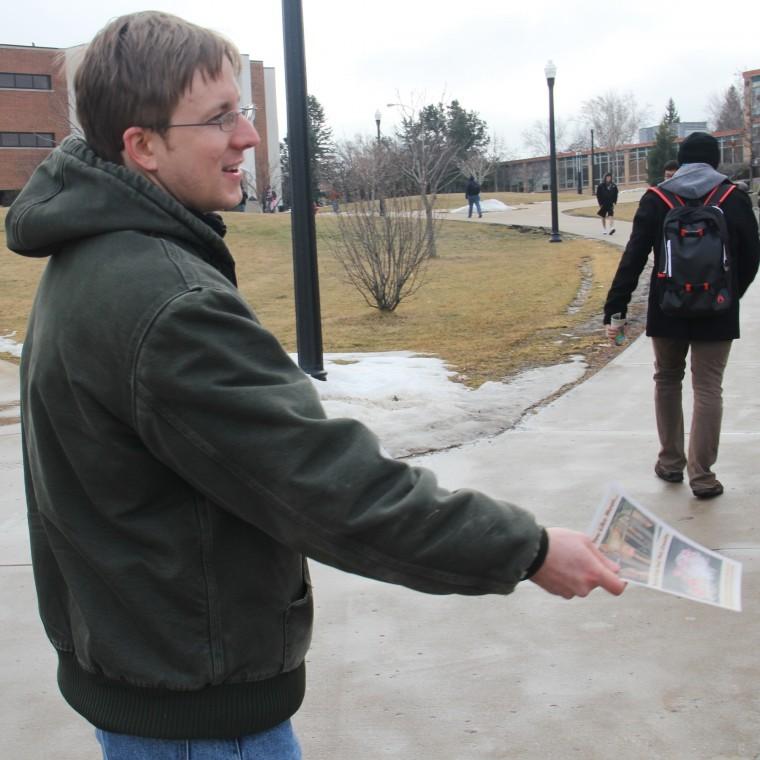Vegan activist talks animal rights, activism
Jon Bockman of St. Charles, 28, NIU Alumnus and Executive Director of Justice for Animals, hands out Vegan Outreach pamphlets Wednesday near DuSable Hall to raise awareness about animal cruelty.
February 5, 2012
NIU alumnus Jon Bockman, executive director of Justice for Animals and founder of AllVeg Delights, handed out pamphlets about animal cruelty to students in front of Cole Hall Wednesday. Bockman aimed to shed light and awareness on animal cruelty and the benefits of a vegan diet.
The Northern Star sat down with Bockman to talk about vegetarianism, veganism and animal activism.
Northern Star: What’s the difference between vegetarian and vegan?
Jon Bockman: Vegetarians abstain from eating animal flesh so they don’t eat any meat. A vegan is someone who doesn’t eat any animal products. That extends to eggs, dairy, milk and cheese. Vegans also abstain from animal products like leather belts and coats.
NS: When did you decide to go vegetarian/vegan?
JB: I went vegetarian my senior year in college after getting a pamphlet. Here I was, I love dogs and cats, I’ve worked as a wildlife rehabilitator now for six years and I worked as a zookeeper for two years. How can I justify loving these other animals and not wanting them to suffer, but then just turn my cheek to what I was eating three times a day.
NS: What’s it like to eat a vegan diet?
JB: All of our nutritional guidelines in pamphlets that you get as a child talks about how great meat is for you and how much we need that protein and milk. But the reality is, I’ve never felt healthier and more vibrant. Following a vegan diet has never been easier. For every meat or animal product today there exists an amazing plant-based alternative for which no animal had to suffer. I’ve explored so many different cuisines that I never explored when I wasn’t vegan.
NS: Where do you get the information for your pamphlets?
JB: It is created by Vegan Outreach. It comes from a wide array of scientific journals, studies conducted with animals, medical doctors, Los Angeles times & New York times articles. All this footage was gained through under-cover investigations.
NS: How do students respond to the pamphlets?
JB: People open the booklets and are shocked. I get people coming back to me and thanking me for giving them a pamphlet because it changed their life. And of course you get your sarcastic people who think they’re clever because they say, “animals are tasty” or some snarky comment. As uncomfortable as it is to deal with a couple rejections here and there, I know that what I’m doing is advocating for animals who are locked in warehouses and tiny cages and have no voice. That alone makes me feel 100 times better, it makes me feel amazing.
NS: How often do you hand pamphlets out at NIU?
JB: We usually do one or two days a semester. Then we try to do a day or two pay-per-view events as well. We actually pay people $1 to watch our four minute video; its an incentive. The documentaries are of undercover investigation footage from national organizations.
NS: What is shown in the documentaries, and what are the students’ reactions?
JB: I would say 80 to 90 percent of students are just eyes open wide, mouths open, and say “I can’t believe this is going on.” Literally, they castrate piglets and dock tails of cows and sheep with no painkillers because there’s no laws on the book for that. They cut off chickens beaks at birth so they can’t peck at each other.
NS: Are there any laws protecting farm animals?
JB: No. We have an animal welfare act; it explicitly excludes farm animals. We have a humane methods of slaughter act; it explicitly excludes birds, which account for 95 percent of all the farmed animals. For laying hens’ cages the United Egg Producers suggests 9 by 9 by 9 inches, less than sheet of paper per bird for them to live a year and a half of their life before they go to slaughter. And that’s just what they recommend.
NS: What is AllVeg Delights?
JB: It sells vegan ready-to-go sandwiches. It’s something where the community wanted that service, so I was happy to provide it. I bring the Huskie Hub an order on Monday, and it lasts the week. My profit is so slim on that; I kind of do it as a side hobby.
NS: What are you suggesting people change?
JB: Of all the animals exploited for research, clothing, entertainment or food, 98 out of every 100 animals are exploited for food. It’s a process for everybody. Just by making “Meatless Mondays” is a good way to start. By cutting meat out of your diet for one day a week, you can help make a difference and remove the demand for these products.



